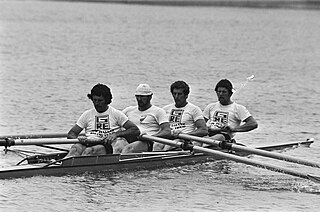- 1962:
 (Meyer, Plagemann, Aeffke, Behrens, Wallbrecht, von Groddeck, Ingo Kliefoth, Bernd Kruse, cox Ahrens) (Meyer, Plagemann, Aeffke, Behrens, Wallbrecht, von Groddeck, Ingo Kliefoth, Bernd Kruse, cox Ahrens) - 1966:
 (Meyer, Schreyer, Schwan, Luhn, Hertel, Henning, Ulbricht, Kuhn, cox Niehusen) (Meyer, Schreyer, Schwan, Luhn, Hertel, Henning, Ulbricht, Kuhn, cox Niehusen) - 1970:
 (Borchmann, Jobst, Zander, Gust, Martens, Ahrendt, Foppke, Puls, cox Zahn) (Borchmann, Jobst, Zander, Gust, Martens, Ahrendt, Foppke, Puls, cox Zahn) - 1974:
 (Shealy, Stevenson, Cashin, Norelius, Everett, Vespoli, Mickelson, Brown, cox Weinberg) (Shealy, Stevenson, Cashin, Norelius, Everett, Vespoli, Mickelson, Brown, cox Weinberg) - 1975:
 (Arndt, Döhn, Wendisch, Ulrich, Klatt, Kostulski, Karnatz, Prudöhl, cox Ludwig) (Arndt, Döhn, Wendisch, Ulrich, Klatt, Kostulski, Karnatz, Prudöhl, cox Ludwig) - 1977:
 (Sredzki, Lindner, Gottschalt, Kons, Lück, Frieberg, Karnatz, Gunkel, cox Jahncke) (Sredzki, Lindner, Gottschalt, Kons, Lück, Frieberg, Karnatz, Gunkel, cox Jahncke) - 1978:
 (Schumann, Karnatz, Sredzki, Ebert, Ulrich, Jährling, Dühring, Höing, cox Kaiser) (Schumann, Karnatz, Sredzki, Ebert, Ulrich, Jährling, Dühring, Höing, cox Kaiser) - 1979:
 (Schiller, Friedrich, Wenzel, Ulrich, Höing, Karnatz, Krauß, Rodewald, cox Ludwig) (Schiller, Friedrich, Wenzel, Ulrich, Höing, Karnatz, Krauß, Rodewald, cox Ludwig) - 1981:
 (Gudauskas, Solomakhin, Krilov, Diduk, Narushaitis, Narmontas, Pinskus, Maystrenka, cox Nizhegorodov) (Gudauskas, Solomakhin, Krilov, Diduk, Narushaitis, Narmontas, Pinskus, Maystrenka, cox Nizhegorodov) - 1982:
 (O'Connell, Stanley, Stevenson, Keys, White-Parsons, White, Brook, Rodger, cox Hay) (O'Connell, Stanley, Stevenson, Keys, White-Parsons, White, Brook, Rodger, cox Hay) - 1983:
 (Stanley, Stevenson, Rodger, White-Parsons, White, Mabbott, Keys, Atherfold, cox Hay) (Stanley, Stevenson, Rodger, White-Parsons, White, Mabbott, Keys, Atherfold, cox Hay) - 1985:
 (Komarov, Diduk, Pinskus, But, Omelyanovich, Hurkovskiy, Voloshin, Vasilyev, cox Dmytrenko) (Komarov, Diduk, Pinskus, But, Omelyanovich, Hurkovskiy, Voloshin, Vasilyev, cox Dmytrenko) - 1986:
 (Galloway, Batten, Cooper, McKay, Doyle, Tomkins, Popa, Evans, cox Caterson) (Galloway, Batten, Cooper, McKay, Doyle, Tomkins, Popa, Evans, cox Caterson) - 1987:
 (Teti, Smith, Patton, Still, Nordell, McLaughlin, Burden, Pescatore, cox Bauer) (Teti, Smith, Patton, Still, Nordell, McLaughlin, Burden, Pescatore, cox Bauer) - 1989:
 (Puttlitz, Keßlau, Steffes-Mies, Balster, Dietrich, Mauerwerk, Wessling, Baar, cox Klein) (Puttlitz, Keßlau, Steffes-Mies, Balster, Dietrich, Mauerwerk, Wessling, Baar, cox Klein) - 1990:
 (Baar, Balster, Dietrich, Korte, Richter, Steffes-Mies, Ungemach, Weyrauch, cox Klein) (Baar, Balster, Dietrich, Korte, Richter, Steffes-Mies, Ungemach, Weyrauch, cox Klein) - 1991:
 (Steffes-Mies, Balster, Fischer, Streppelhoff, Hecht, Klapheck, Wessling, Baar, cox Klein) (Steffes-Mies, Balster, Fischer, Streppelhoff, Hecht, Klapheck, Wessling, Baar, cox Klein) - 1993:
 (Baar, Hoeltzenbein, Lütkefels, Richter, Scholz, Steffes-Mies, Streppelhoff, von Ettingshausen, cox Thiede) (Baar, Hoeltzenbein, Lütkefels, Richter, Scholz, Steffes-Mies, Streppelhoff, von Ettingshausen, cox Thiede) - 1994:
 (Brown, Hall, Honebein, Kaehler, Klepacki, Koven, McKibbon, Smith, cox Segaloff) (Brown, Hall, Honebein, Kaehler, Klepacki, Koven, McKibbon, Smith, cox Segaloff) - 1995:
 (Baar, Forster, Kirchhoff, Landvoigt, Lerche, Richter, Sator, Weber, cox Thiede) (Baar, Forster, Kirchhoff, Landvoigt, Lerche, Richter, Sator, Weber, cox Thiede) - 1997:
 (Ahrens, Bea, Henry, Kaehler, Miller, Richter, Wherley, Cummins, cox Cipollone) (Ahrens, Bea, Henry, Kaehler, Miller, Richter, Wherley, Cummins, cox Cipollone) - 1998:
 (Ahrens, Collins, Kaehler, Klepacki, Miller, Volpenhein, Welsh, Wherley, cox Cipollone) (Ahrens, Collins, Kaehler, Klepacki, Miller, Volpenhein, Welsh, Wherley, cox Cipollone) - 1999:
 (Volpenhein, Kaehler, Collins, Welsh, Wherley, Klepacki, Miller, Ahrens, cox Cipollone) (Volpenhein, Kaehler, Collins, Welsh, Wherley, Klepacki, Miller, Ahrens, cox Cipollone) - 2001:
 (Măstăcan, Corbeanu, Nemțoc, Florariu, Cornea, Bănică, Pîrvan, Măstăcan, cox Gheorghe) (Măstăcan, Corbeanu, Nemțoc, Florariu, Cornea, Bănică, Pîrvan, Măstăcan, cox Gheorghe) - 2002:
 (Swick, Light, Rutledge, Hamilton, Stankevicius, Hoskins, Kreek, Powell, cox Price) (Swick, Light, Rutledge, Hamilton, Stankevicius, Hoskins, Kreek, Powell, cox Price) - 2003:
 (Stankevicius, Light, Rutledge, Hamilton, Calder, Hoskins, Kreek, Powell, cox Price) (Stankevicius, Light, Rutledge, Hamilton, Calder, Hoskins, Kreek, Powell, cox Price) - 2005:
 (Daniels, Deakin, Coppola, Beery, Inman, Volpenhein, Hoopman, McElhenney, cox Blomquist) (Daniels, Deakin, Coppola, Beery, Inman, Volpenhein, Hoopman, McElhenney, cox Blomquist) - 2006:
 (Dießner, Schulte, Koltzk, Stüer, Tebrügge, Siemes, Engelmann, Heidicker, cox Thiede) (Dießner, Schulte, Koltzk, Stüer, Tebrügge, Siemes, Engelmann, Heidicker, cox Thiede) - 2007:
 (Light, Rutledge, Byrnes, Wetzel, Howard, Seiterle, Kreek, Hamilton, cox Price) (Light, Rutledge, Byrnes, Wetzel, Howard, Seiterle, Kreek, Hamilton, cox Price) - 2009:
 (Käufer, Hauffe, Mennigen, Wilke, Schmidt, Adamski, Seifert, Schmidt, cox Sauer) (Käufer, Hauffe, Mennigen, Wilke, Schmidt, Adamski, Seifert, Schmidt, cox Sauer) - 2010:
 (Hauffe, Reinelt, Wilke, Mennigen, Schmidt, Müller, Seifert, Schmidt, cox Sauer) (Hauffe, Reinelt, Wilke, Mennigen, Schmidt, Müller, Seifert, Schmidt, cox Sauer) - 2011:
 (Hauffe, Kuffner, Johannesen, Reinelt, Schmidt, Müller, Mennigen, Wilke, cox Sauer) (Hauffe, Kuffner, Johannesen, Reinelt, Schmidt, Müller, Mennigen, Wilke, cox Sauer) - 2013:
 (Ritchie, Ransley, Gregory, Reed, Sbihi, Triggs Hodge, Nash, Satch, cox Hill) (Ritchie, Ransley, Gregory, Reed, Sbihi, Triggs Hodge, Nash, Satch, cox Hill) - 2014:
 (Reilly-O'Donnell, Tarrant, Satch, Gotrel, Reed, Bennett, Ransley, Louloudis, cox Hill) (Reilly-O'Donnell, Tarrant, Satch, Gotrel, Reed, Bennett, Ransley, Louloudis, cox Hill) - 2015:
 (Gotrel, Louloudis, Reed, Bennett, Sbihi, Gregory, Nash, Satch, cox Hill) (Gotrel, Louloudis, Reed, Bennett, Sbihi, Gregory, Nash, Satch, cox Hill) - 2017:
 (Weißenfeld, Wimberger, Planer, Johannesen, Schneider, Jakschik, Schmidt, Ocik, cox Sauer) (Weißenfeld, Wimberger, Planer, Johannesen, Schneider, Jakschik, Schmidt, Ocik, cox Sauer) - 2018:
 (Weißenfeld, Wimberger, Planer, Johannesen, Schneider, Jakschik, Schmidt, Ocik, cox Sauer) (Weißenfeld, Wimberger, Planer, Johannesen, Schneider, Jakschik, Schmidt, Ocik, cox Sauer) - 2019:
 (Weißenfeld, Follert, Reinhardt, Johannesen, Schneider, Jakschik, Schmidt, Ocik, cox Sauer) (Weißenfeld, Follert, Reinhardt, Johannesen, Schneider, Jakschik, Schmidt, Ocik, cox Sauer)
|



